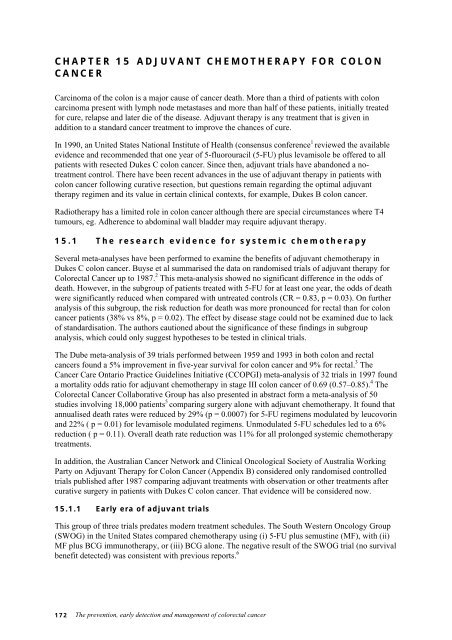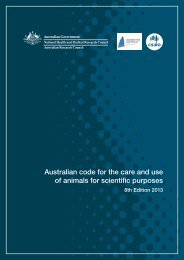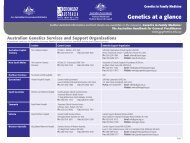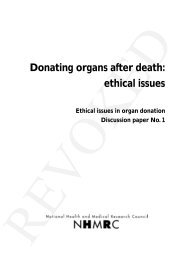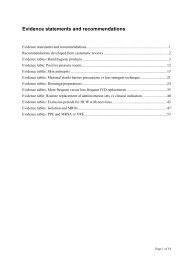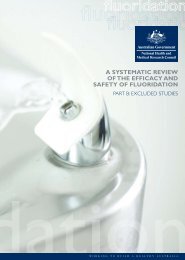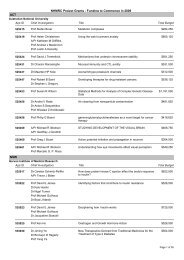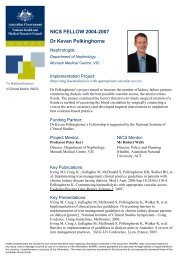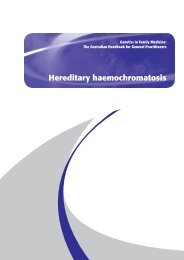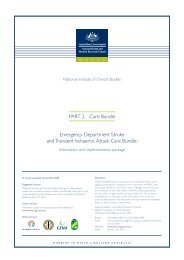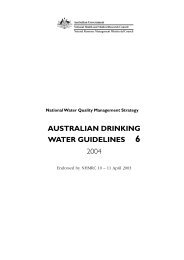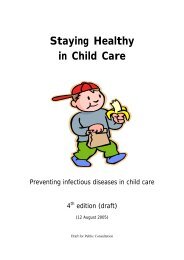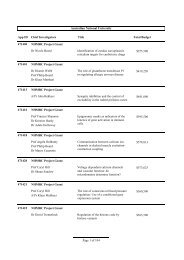Clinical Practice Guidelines - National Health and Medical Research ...
Clinical Practice Guidelines - National Health and Medical Research ...
Clinical Practice Guidelines - National Health and Medical Research ...
Create successful ePaper yourself
Turn your PDF publications into a flip-book with our unique Google optimized e-Paper software.
CHAPTER 15 ADJUVANT CHEMOTHERAPY FOR COLON<br />
CANCER<br />
Carcinoma of the colon is a major cause of cancer death. More than a third of patients with colon<br />
carcinoma present with lymph node metastases <strong>and</strong> more than half of these patients, initially treated<br />
for cure, relapse <strong>and</strong> later die of the disease. Adjuvant therapy is any treatment that is given in<br />
addition to a st<strong>and</strong>ard cancer treatment to improve the chances of cure.<br />
In 1990, an United States <strong>National</strong> Institute of <strong>Health</strong> (consensus conference 1 reviewed the available<br />
evidence <strong>and</strong> recommended that one year of 5-fluorouracil (5-FU) plus levamisole be offered to all<br />
patients with resected Dukes C colon cancer. Since then, adjuvant trials have ab<strong>and</strong>oned a notreatment<br />
control. There have been recent advances in the use of adjuvant therapy in patients with<br />
colon cancer following curative resection, but questions remain regarding the optimal adjuvant<br />
therapy regimen <strong>and</strong> its value in certain clinical contexts, for example, Dukes B colon cancer.<br />
Radiotherapy has a limited role in colon cancer although there are special circumstances where T4<br />
tumours, eg. Adherence to abdominal wall bladder may require adjuvant therapy.<br />
15.1 The research evidence for systemic chemotherapy<br />
Several meta-analyses have been performed to examine the benefits of adjuvant chemotherapy in<br />
Dukes C colon cancer. Buyse et al summarised the data on r<strong>and</strong>omised trials of adjuvant therapy for<br />
Colorectal Cancer up to 1987. 2 This meta-analysis showed no significant difference in the odds of<br />
death. However, in the subgroup of patients treated with 5-FU for at least one year, the odds of death<br />
were significantly reduced when compared with untreated controls (CR = 0.83, p = 0.03). On further<br />
analysis of this subgroup, the risk reduction for death was more pronounced for rectal than for colon<br />
cancer patients (38% vs 8%, p = 0.02). The effect by disease stage could not be examined due to lack<br />
of st<strong>and</strong>ardisation. The authors cautioned about the significance of these findings in subgroup<br />
analysis, which could only suggest hypotheses to be tested in clinical trials.<br />
The Dube meta-analysis of 39 trials performed between 1959 <strong>and</strong> 1993 in both colon <strong>and</strong> rectal<br />
cancers found a 5% improvement in five-year survival for colon cancer <strong>and</strong> 9% for rectal. 3 The<br />
Cancer Care Ontario <strong>Practice</strong> <strong>Guidelines</strong> Initiative (CCOPGI) meta-analysis of 32 trials in 1997 found<br />
a mortality odds ratio for adjuvant chemotherapy in stage III colon cancer of 0.69 (0.57–0.85). 4 The<br />
Colorectal Cancer Collaborative Group has also presented in abstract form a meta-analysis of 50<br />
studies involving 18,000 patients 5 comparing surgery alone with adjuvant chemotherapy. It found that<br />
annualised death rates were reduced by 29% (p = 0.0007) for 5-FU regimens modulated by leucovorin<br />
<strong>and</strong> 22% ( p = 0.01) for levamisole modulated regimens. Unmodulated 5-FU schedules led to a 6%<br />
reduction ( p = 0.11). Overall death rate reduction was 11% for all prolonged systemic chemotherapy<br />
treatments.<br />
In addition, the Australian Cancer Network <strong>and</strong> <strong>Clinical</strong> Oncological Society of Australia Working<br />
Party on Adjuvant Therapy for Colon Cancer (Appendix B) considered only r<strong>and</strong>omised controlled<br />
trials published after 1987 comparing adjuvant treatments with observation or other treatments after<br />
curative surgery in patients with Dukes C colon cancer. That evidence will be considered now.<br />
15.1.1 Early era of adjuvant trials<br />
This group of three trials predates modern treatment schedules. The South Western Oncology Group<br />
(SWOG) in the United States compared chemotherapy using (i) 5-FU plus semustine (MF), with (ii)<br />
MF plus BCG immunotherapy, or (iii) BCG alone. The negative result of the SWOG trial (no survival<br />
benefit detected) was consistent with previous reports. 6<br />
172<br />
The prevention, early detection <strong>and</strong> management of colorectal cancer


